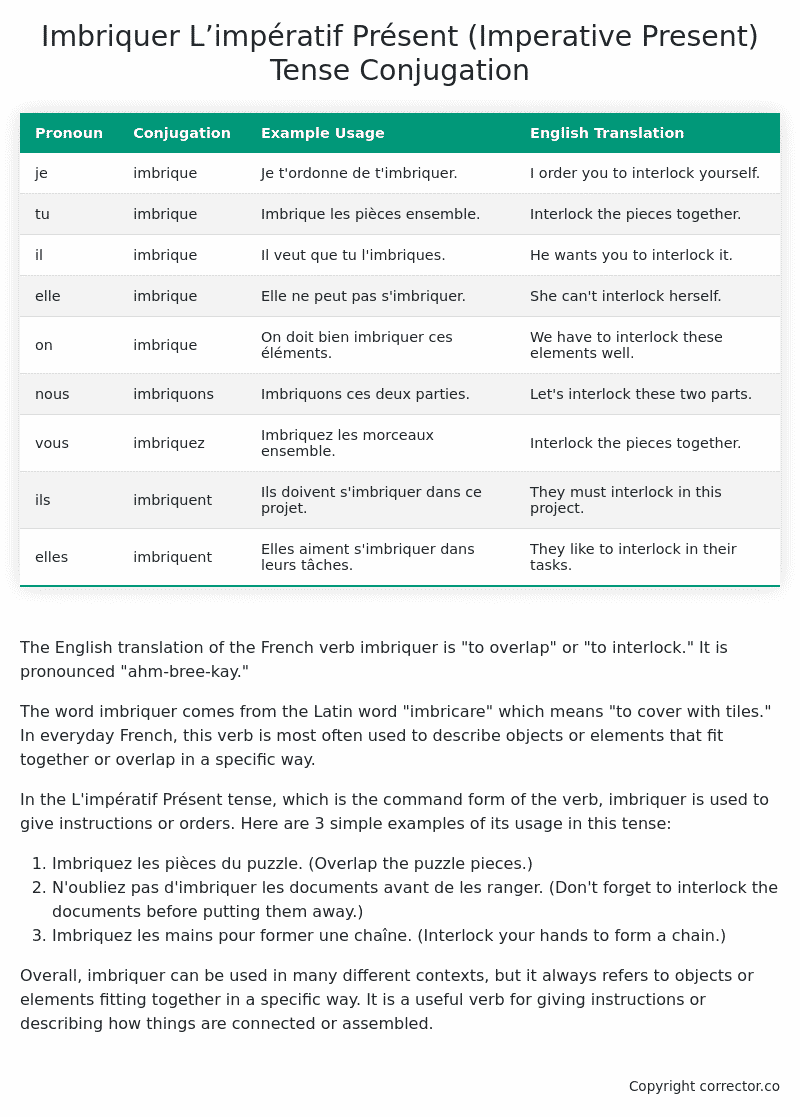L’impératif Présent (Imperative Present) Tense Conjugation of the French Verb imbriquer
Introduction to the verb imbriquer
The English translation of the French verb imbriquer is “to overlap” or “to interlock.” It is pronounced “ahm-bree-kay.”
The word imbriquer comes from the Latin word “imbricare” which means “to cover with tiles.” In everyday French, this verb is most often used to describe objects or elements that fit together or overlap in a specific way.
In the L’impératif Présent tense, which is the command form of the verb, imbriquer is used to give instructions or orders. Here are 3 simple examples of its usage in this tense:
- Imbriquez les pièces du puzzle. (Overlap the puzzle pieces.)
- N’oubliez pas d’imbriquer les documents avant de les ranger. (Don’t forget to interlock the documents before putting them away.)
- Imbriquez les mains pour former une chaîne. (Interlock your hands to form a chain.)
Overall, imbriquer can be used in many different contexts, but it always refers to objects or elements fitting together in a specific way. It is a useful verb for giving instructions or describing how things are connected or assembled.
Table of the L’impératif Présent (Imperative Present) Tense Conjugation of imbriquer
| Pronoun | Conjugation | Example Usage | English Translation |
|---|---|---|---|
| je | imbrique | Je t’ordonne de t’imbriquer. | I order you to interlock yourself. |
| tu | imbrique | Imbrique les pièces ensemble. | Interlock the pieces together. |
| il | imbrique | Il veut que tu l’imbriques. | He wants you to interlock it. |
| elle | imbrique | Elle ne peut pas s’imbriquer. | She can’t interlock herself. |
| on | imbrique | On doit bien imbriquer ces éléments. | We have to interlock these elements well. |
| nous | imbriquons | Imbriquons ces deux parties. | Let’s interlock these two parts. |
| vous | imbriquez | Imbriquez les morceaux ensemble. | Interlock the pieces together. |
| ils | imbriquent | Ils doivent s’imbriquer dans ce projet. | They must interlock in this project. |
| elles | imbriquent | Elles aiment s’imbriquer dans leurs tâches. | They like to interlock in their tasks. |
Other Conjugations for Imbriquer.
Le Present (Present Tense) Conjugation of the French Verb imbriquer
Imparfait (Imperfect) Tense Conjugation of the French Verb imbriquer
Passé Simple (Simple Past) Tense Conjugation of the French Verb imbriquer
Passé Composé (Present Perfect) Tense Conjugation of the French Verb imbriquer
Futur Simple (Simple Future) Tense Conjugation of the French Verb imbriquer
Futur Proche (Near Future) Tense Conjugation of the French Verb imbriquer
Plus-que-parfait (Pluperfect) Tense Conjugation of the French Verb imbriquer
Passé Antérieur (Past Anterior) Tense Conjugation of the French Verb imbriquer
Futur Antérieur (Future Anterior) Tense Conjugation of the French Verb imbriquer
Subjonctif Présent (Subjunctive Present) Tense Conjugation of the French Verb imbriquer
Subjonctif Passé (Subjunctive Past) Tense Conjugation of the French Verb imbriquer
Subjonctif Imparfait (Subjunctive Imperfect) Tense Conjugation of the French Verb imbriquer
Subjonctif Plus-que-parfait (Subjunctive Pluperfect) Tense Conjugation of the French Verb imbriquer
Conditionnel Présent (Conditional Present) Tense Conjugation of the French Verb imbriquer
Conditionnel Passé (Conditional Past) Tense Conjugation of the French Verb imbriquer
L’impératif Présent (Imperative Present) Tense Conjugation of the French Verb imbriquer (this article)
L’infinitif Présent (Infinitive Present) Tense Conjugation of the French Verb imbriquer
Struggling with French verbs or the language in general? Why not use our free French Grammar Checker – no registration required!
Get a FREE Download Study Sheet of this Conjugation 🔥
Simply right click the image below, click “save image” and get your free reference for the imbriquer L’impératif Présent tense conjugation!

Imbriquer – About the French L’impératif Présent (Imperative Present) Tense
Usage
Giving commands
Making requests
Offering advice
Expressing desires
Conjugation Formation
Interactions with other tenses
Want More?
I hope you enjoyed this article on the verb imbriquer. Still in a learning mood? Check out another TOTALLY random French verb conjugation!


